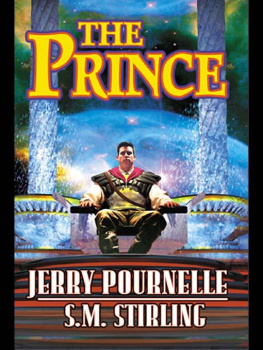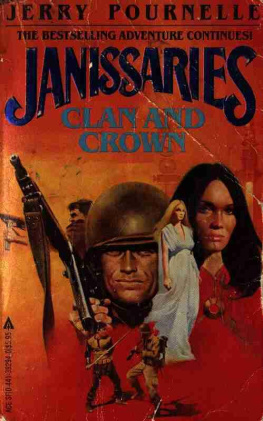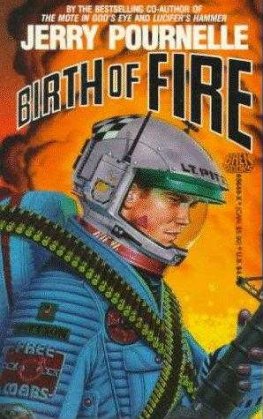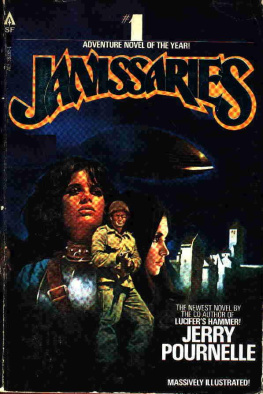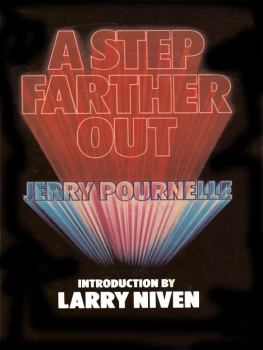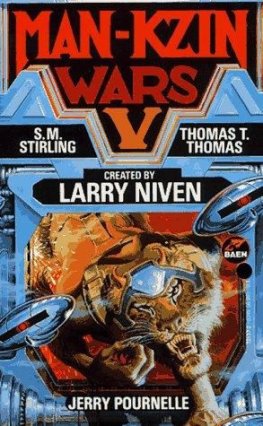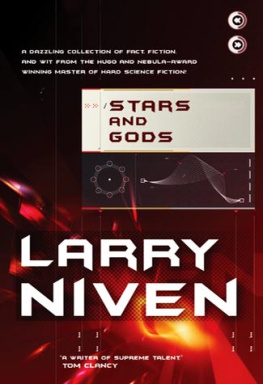Jerry Pournelle - West of Honor
Here you can read online Jerry Pournelle - West of Honor full text of the book (entire story) in english for free. Download pdf and epub, get meaning, cover and reviews about this ebook. genre: Science fiction. Description of the work, (preface) as well as reviews are available. Best literature library LitArk.com created for fans of good reading and offers a wide selection of genres:
Romance novel
Science fiction
Adventure
Detective
Science
History
Home and family
Prose
Art
Politics
Computer
Non-fiction
Religion
Business
Children
Humor
Choose a favorite category and find really read worthwhile books. Enjoy immersion in the world of imagination, feel the emotions of the characters or learn something new for yourself, make an fascinating discovery.

- Book:West of Honor
- Author:
- Genre:
- Rating:3 / 5
- Favourites:Add to favourites
- Your mark:
- 60
- 1
- 2
- 3
- 4
- 5
West of Honor: summary, description and annotation
We offer to read an annotation, description, summary or preface (depends on what the author of the book "West of Honor" wrote himself). If you haven't found the necessary information about the book — write in the comments, we will try to find it.
West of Honor — read online for free the complete book (whole text) full work
Below is the text of the book, divided by pages. System saving the place of the last page read, allows you to conveniently read the book "West of Honor" online for free, without having to search again every time where you left off. Put a bookmark, and you can go to the page where you finished reading at any time.
Font size:
Interval:
Bookmark:

Jerry Pournelle
West of Honor
This is a work of fiction. All the characters and events portrayed in this book are fictional, and any resemblance to real people or incidents is purely coincidental.
Copyright 1976, 1978 by Jerry Pournelle
All rights reserved, including the right to reproduce this book or portions thereof in any form.
A Baen Books Original Omnibus
Baen Publishing Enterprises
P.O. Box 1403
Riverdale, NY 10471
www.baen.com
ISBN: 0-671-65347-4
Cover art by Wayne Barlowe
First Baen printing, August 1987
Distributed by Simon amp; Schuster
1230 Avenue of the Americas
New York, NY 10020
Production by Windhaven Press, Auburn, NH
Printed in the United States of America
To Junior Officers Everywhere
Chronology
1969
Neil Armstrong sets foot on Earth's Moon.
1990-2000
Series of treaties between U.S. and Soviet Union creates the CoDominium. Military research and development outlawed.
1995
Nationalist movements intensify.
1996
French Foreign Legion forms the basic element of the CoDominium Armed Services.
2004
Alderson drive perfected at Cal Tech.
2008
First Alderson Drive exploratory ships leave the Solar System.
2010-2100
CoDominium Intelligence Services engage in serious effort to suppress all research into technologies with military applications. They are aided by zero-growth organizations. Most scientific research ceases.
2010
Inhabitable planets discovered. Commercial exploitation begins.
2020
First interstellar colonies are founded. The CoDominium Space Navy and Marines are created, absorbing the original CoDominium Armed Services.
2020
Great Exodus period of colonization begins. First colonists are dissidents, malcontents, and voluntary adventurers.
2030
Sergei Lermontov is born in Moscow.
2040
Bureau of Relocations begins mass outsystem shipment of involuntary colonists.
2043
John Christian Falkenberg III is born in Rome, Italy.
2060
Nationalistic revival movements continue.
Prologue

2064 AD.
The bright future she sang of was already stiffened in blood, but Kathryn Malcolm didn't know that, any more than she knew that the sun was orange-red and too bright, or that the gravity was too low.
She had lived all of her sixteen standard years on Arrarat, and although her grandfather often spoke of Earth, humanity's birthplace was no home to her. Earth was a place of machines and concrete roads and automobiles and great cities, a place where people crowded together far from the land. When she thought of Earth at all, it seemed an ugly place, hardly fit for people to live on.
Mostly she wondered how Earth would smell. With all those people huddled together-certainly it must be different from Arrarat. She inhaled deeply, filling her lungs with the pleasing smell of newly turned soil. The land here was good. It felt right beneath her feet. Dark and crumbly, moist enough to take hold of the seeds and nurture them, but not wet and full of clods: good land, perfect land for the late-season crop she was planting.
She walked steadily behind the plow, using a long whip to guide the oxen. She flicked the whip near the leaders, but never close enough to touch them. There was no need for that. Horace and Star knew what she wanted. The whip guided them and assured them that she was watching, but they knew the spiral path as well as she did. The plow turned the soil inward so that the center of the field would be higher than the edges. That helped to drain the field and made it easier to harvest two crops each year.
The early harvest was already gathered into the stone barn. Wheat and corn, genetically adapted for Arrarat; and in another part of the barn were Arrarat's native breadfruit melons, full of sugar and ready to begin fermentation. It had been a good year, with more than enough for the family to eat. There would be a surplus to sell in town, and Kathryn's mother had promised to buy a bolt of printed cloth for a new dress that Kathryn could wear for Emil.
At the moment, though, she wore coveralls and high boots, and she was glad enough that Emil couldn't see her. He should know that she could plow as straight a furrow as any man, and that she could ride as well as her brother-but knowing it and seeing her here on the fields were two different things entirely, and she was glad that he couldn't see her just now. She laughed at herself when she thought this, but that didn't stop the thoughts.
She twitched the whip to move the oxen slightly outward, then frowned imperceptibly. The second pair in the string had never pulled a wagon across the plains, and Kathryn thought that she could no longer put off their training. Emil would not want to live with Kathryn's grandfather. A man wanted land of his own, even though there were more than a thousand hectares in the Malcolm station.
The land here was taken. If she and Emil were to have land of their own, they would have to move westward, toward the other sea, where the satellite pictures showed good land. We could go, she thought; go so far that the convicts will never find us, and the city will be a place to see once in a lifetime. It would be exciting, although she would hate to leave this valley.
The field she plowed lay among low hills. A small stream meandered along one edge. Most of the crops and trees that she could see had come from Earth as seeds, and they had few predators. Most crop-eaters left Earth plants alone, especially if the fields were bordered with spearmints and marigolds to give off odors that even Earth insects detested.
She thought of what she would need if they struck west to found a new settlement. Seeds they would have; and a mare and stallion, and two pairs of oxen; chickens and swine; her grandfather was rich by local standards. There would be her father's blacksmithing tools, which Emil could learn to use.
They would need a television. Those were rare. A television, and solar cells, and a generator for the windmill; such manufactured goods had to be bought in the city, and that took money. The second crop would be needed this year, and a large one next spring, as well-and they would have to keep all the money they earned. She thrust that thought away, but her hand strayed toward the big sheath knife she wore on her belt.
We will manage, she thought. We will find the money. Children should not go without education. Television was not for entertainment. The programs relayed by the satellites gave weather reports and taught farming, ecology, engineering, metalwork-all the skills needed to live on Arrarat. They also taught reading and mathematics. Most of Kathryn's neighbors despised television and wouldn't have it in their houses, but their children had to learn from others who watched the screen.
And yet, Kathryn thought, there is cause for concern. First it is television. Then light industry. Soon there is more. Mines are opened. Larger factories are built, and around them grow cities. She thought of Arrarat covered with cities and concrete, the animals replaced by tractors and automobiles, the small villages grown into cities; people packed together the way they were in Harmony and Garrison; streams dammed and lakes dirty with sewage; and she shuddered. Not in my time, or my grandchildren's. And perhaps we will be smarter than they were on Earth, and it will never happen here. We know better now. We know how to live with the land.
Next pageFont size:
Interval:
Bookmark:
Similar books «West of Honor»
Look at similar books to West of Honor. We have selected literature similar in name and meaning in the hope of providing readers with more options to find new, interesting, not yet read works.
Discussion, reviews of the book West of Honor and just readers' own opinions. Leave your comments, write what you think about the work, its meaning or the main characters. Specify what exactly you liked and what you didn't like, and why you think so.

